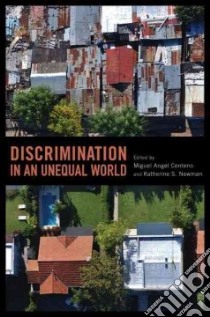Discrimination in an Unequal World - 9780199732173
Un libro in lingua di Centeno Miguel Angel (EDT) Newman Katherine S. (EDT) edito da Oxford University Press, 2010
- € 27.00
- Il prezzo è variabile in funzione del cambio della valuta d’origine
"A major entry in the study of contemporary social inequality. These essays provide a critical base for establishing what is general about discrimination and what is contextually or culturally dependent. From the politics of affirmative action and immigration, to gender barriers, to complex color hierarchies and rationales for exclusion, Discrimination in an Unequal World maps the current logic, patterns, and dynamics of bias in an increasingly economically interconnected global system. I highly recommend this volume to scholars of ethnicity, race, gender, and class inequality."---Lawrence D. Bobo, W. E. B. Du Bois Professor of the Social Sciences, Harvard University
"Sharp inequalities are basic features of global integration. While some can be seen in global statistics, more require detailed analysis of specific places, local markets, and economic niches. This impressive book brings a troubling but important reality into clear focus and addresses the challenge of comparable measurement together with the complexities of case studies."---Craig Calhoun, President, Social Science Research Council
Is globalization making our world more equal, or less? Proponents of globalization argue that it is helping and that in a competitive world, no one can afford to discriminate except on the basis of skills. Opponents counter that globalization does nothing but provide a meritocratic patina on a consistently unequal distribution of opportunity. Yet, despite the often deafening volume of the debate, there is surprisingly little empirical work available on the extent to which the process of globalization over the past quarter century has had any effect on discrimination. Tackling this challenge, Discrimination in an Unequal World explores the relationship between discrimination and unequal outcomes in the appropriate geographical and historical context. Noting how each society tends to see its particular version of discrimination as universal and obvious, the editors expand their set of cases to include a broad variety of social relations and practices. However, since methods differ and are often designed for particular national circumstances, they set the much more ambitious and practical goal of establishing a base with which different forms of discrimination across the world can be compared. Derived from a broad array of methods, the book draws many important lessons on the new means by which the world creates social hierarchies, the democratization of inequality, and the disappearance of traditional categories
Informazioni bibliografiche
- Titolo del Libro in lingua: Discrimination in an Unequal World
- Lingua: English
- Autori : Centeno Miguel Angel (EDT) Newman Katherine S. (EDT)
- Editore: Oxford University Press
- Collana: Oxford Univ Pr (Paperback)
- Data di Pubblicazione: 01 Gennaio '10
- Genere: SOCIAL SCIENCE
- Argomenti : Discrimination Racism Equality
- Pagine: 336
- ISBN-10: 0199732175
- EAN-13: 9780199732173


